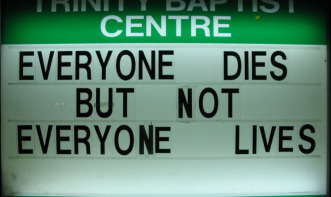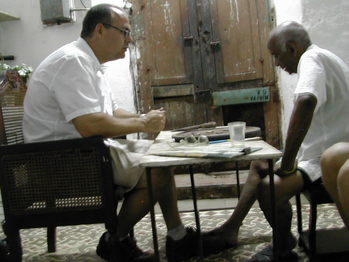Refranes (Proverbs)
|
Proverbs are used in a way similar to the patakis. Each odu (sign, letter in divination) has specific proverbs attached to it. These have been established by custom and tradition, and are transmitted orally from elders to godchildren in the religious community. How many proverbs are there? This question is open to debate, since not all ilés (religious houses) know the same number of proverbs for each odu. Generally, Santeros/as hope to learn as many proverbs as possible, because it allows them to be more skilled diviners. |
Proverbs as Symbols and Metaphors for Life

Proverbs cross cultures
The proverbs are used to interpret the odu, to give them deeper symbolic and metaphorical meaning that the client can apply to his or her life. They also act as mnemonic devices, to jar the memory of the diviner in terms of the odu's deeper meaning. For example, the proverb that states "With the tongue you can save or destroy the town" reminds the diviner that the odu Obara (6), which is attached to this proverb, talks about the power of the client's tongue to convert words into reality. The client has to be careful about how he uses his tongue, because he can do great harm or great good through his words.
Some of the proverbs have made their way into common folk wisdom and can be heard in a variety of situations, not connected in any way to Santería. For example, the proverb that says "No flies get into a closed mouth" is liked to the odu Obara (6), again warning about the dangers of the tongue, specifically of talking too much. But, this proverb is widely known in the Spanish-speaking world, and is used as general advice to people who talk indiscreetly. People who use the proverb may have no knowledge of Santería, but use it simply because it's deeply entrenched in the culture. Like patakis, the proverbs (refranes) are sacred knowledge and represent serious advice from Orichás when they come in a consulta reading. The diviner may use a proverb to begin the reading, to set the tone, or to teach a moral lesson that the client can link to his life. The proverbs and patakis can be used interchangeably and to complement each other. Since patakis are longer, a diviner will usually limit the number of patakis he tells during one reading, but he or she may use a number of refranes (proverbs) that convey similar meaning in a shorter form.
Some of the proverbs have made their way into common folk wisdom and can be heard in a variety of situations, not connected in any way to Santería. For example, the proverb that says "No flies get into a closed mouth" is liked to the odu Obara (6), again warning about the dangers of the tongue, specifically of talking too much. But, this proverb is widely known in the Spanish-speaking world, and is used as general advice to people who talk indiscreetly. People who use the proverb may have no knowledge of Santería, but use it simply because it's deeply entrenched in the culture. Like patakis, the proverbs (refranes) are sacred knowledge and represent serious advice from Orichás when they come in a consulta reading. The diviner may use a proverb to begin the reading, to set the tone, or to teach a moral lesson that the client can link to his life. The proverbs and patakis can be used interchangeably and to complement each other. Since patakis are longer, a diviner will usually limit the number of patakis he tells during one reading, but he or she may use a number of refranes (proverbs) that convey similar meaning in a shorter form.
The Wisdom of Afro-Cuban Culture

Consultas direct clients toward a better life
All cultures have popular sayings that reveal folk wisdom, but the refranes of Santería are more than that. Because they're linked to odu, the letters or signs that come in a divination with dilogún (cowrie shells) or the epuele (Babalawo's divining chain), they're sacred messages from the Orichás. When a client goes to a Santero/a or Babalawo for a consulta, the pattern of shells that fall on the mat are linked to specific odu, which carry special meaning for the client at that time. Each odu has patakís (sacred stories) and refranes associated with it, which help the diviner remember what the most important lessons of the odu are. A good diviner will know as many of the patakís and refranes as possible, because they encapsulate key ideas that the client needs to know in order to live a more prosperous and meaningful life.
In addition to their important religious function in the divination process, the refranes of Cuban Santería are fascinating windows into the history and philosophy of the Lucumí people. They reveal strategies for survival developed by oppressed people in difficult circumstances. They reflect the values of the Afro-Cuban people, such as the need for discretion, the importance of keeping a cool head, and the dangers that go with excessive pride, envy, or arrogance. Most of the refranes have several levels of symbolic or metaphorical meaning that take them way beyond their literal sense. Despite their old-fashioned flavor, they're timeless jewels of wisdom. Anyone can benefit from them, at any time. They can be easily applied to every day life lessons.
The video below is the opening sequence of a divination carried out by a Babalawo in Cuba. He is praying in Lucumí, the liturgical language of Santería, asking for the participation of Orula in the ceremony. Once he pulls out the odu, he will start interpreting it through his knowledge of refranes and patakis.
In addition to their important religious function in the divination process, the refranes of Cuban Santería are fascinating windows into the history and philosophy of the Lucumí people. They reveal strategies for survival developed by oppressed people in difficult circumstances. They reflect the values of the Afro-Cuban people, such as the need for discretion, the importance of keeping a cool head, and the dangers that go with excessive pride, envy, or arrogance. Most of the refranes have several levels of symbolic or metaphorical meaning that take them way beyond their literal sense. Despite their old-fashioned flavor, they're timeless jewels of wisdom. Anyone can benefit from them, at any time. They can be easily applied to every day life lessons.
The video below is the opening sequence of a divination carried out by a Babalawo in Cuba. He is praying in Lucumí, the liturgical language of Santería, asking for the participation of Orula in the ceremony. Once he pulls out the odu, he will start interpreting it through his knowledge of refranes and patakis.

